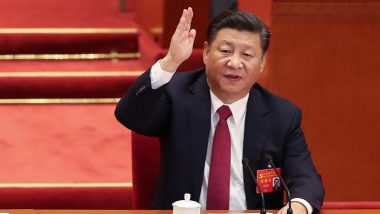Beijing, Mar 11: China's incumbent President Xi Jinping could continue to remain at the helm of the nation for his entire life as the Parliament has removed the constitutional hurdles. In the law-amendment voting held on Sunday, the rubber-stamp legislature abolished the two-term presidential limit norm with a brute majority.
A total of 2,958 delegates voted in favour of amending the existing law, whereas, only two stood against it.
Ju Xiuqin, a delegate from northeastern Heilongjiang province, said the proposal not only had the backing of the legislature, but the masses as well. "People of China want to abolish the two-term limit to allow President Xi to fulfill his vision," he told reporters after the vote-count.
Xi's second term as China's President was scheduled to conclude in 2023. However, the ambitious political and global-economic plans embarked upon his regime could take upto two decades for completion.
Among the unprecedented projects spearheaded by China under Xi's rule so far include the revival of the 'Silk Route', connecting Beijing to midland Europe; the Belt and Road initiative, which aims to connect South East Asia to West Asia with parallel network of trains, highways and freight corridors.
The modernisation of Chinese military also remains on the top agenda under Xi's presidency. In the recently announced Budget, the parliament allocated 1.11 trillion yuan, or 8.1 percent of the fiscal share for military upgradation.
Although Xi's tenure has further consolidated China's position as a global power, critics at home have levelled allegation of rights' violations, curbing of dissent and press freedom against his regime.
Chinese political commentator Wu Qiang, based in Hong Kong, predicts a more authoritarian stand to be taken by Beijing following the abolition of two-term presidential limit.
Qiang, while speaking to AFP, said power would now remain concentrated in the hands of Communist Party's Politburo. "They will prevent power from falling into the hands of technocrats like Jiang (Zemin) and Hu (Jintao)," he said, referring to the former presidents who adhered to the two-term norm.
The norm to restrict presidency for two-terms was inserted into the Constitution by former president Deng Xiaoping in 1983. Analysts claim the move was adopted in view of the consequences faced by China due to the "cultural revolution misadventure" of Communist China's founding leader Mao Zedong.
Zedong, who ruled the nation till his death, is charged of adopting "oppressive" and anti-people measures during the latter era of his rule.
Xi, despite facing flak on Weibo - China's own version of Twitter - for turning his presidency indefinite, enjoys goodwill among a large section of the populace for his crackdown on corruption, experts claim. Under his tenure, over million officials have been rigorously prosecuted under graft charges.
(The above story first appeared on LatestLY on Mar 11, 2018 02:08 PM IST. For more news and updates on politics, world, sports, entertainment and lifestyle, log on to our website latestly.com).













 Quickly
Quickly



















